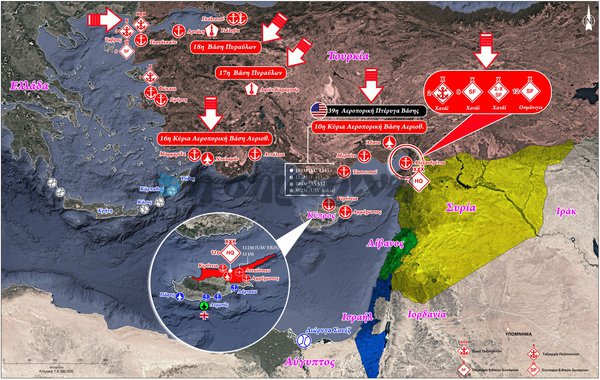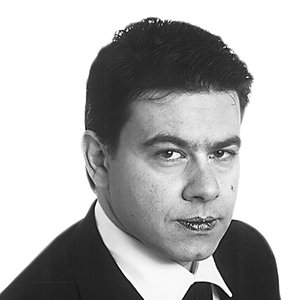New Turkish Missile and Drone Bases with Cyprus as an “aircraft carrier”
Upgrading Marines, Naval and Air Forces from the Dardanelles to Alexandretta
• How the Turkish threat justifies the purchase of new weapons systems
• Turkish Frigates at Aksaz
Turkey is reinforcing its military presence in the Eastern Mediterranean, using Cyprus as a forward base. This strategy is broad in scope, but given developments in the Middle East, Ankara now focuses not only on the Aegean but also on Syria, Lebanon, and Palestine — with Israel as its primary adversary. At times, Israel has claimed that Turkey is not its enemy. Yet what matters is not the diplomatic façade, but Ankara’s actions. Turkish behavior fully justifies the Republic of Cyprus acquiring the modern Barak MX missile-defense system from Israel, as well as other U.S.-made systems from the relevant list, in line with the new partnership framework with Washington.
The Marines and the Commandos
Recently, Turkey has pressed ahead with a significant upgrade of its armed forces. It has created a Marine Corps Command uniting all marine brigades under one structure. Previously, there was only one marine brigade — the 1st, based at Phocaea, tasked with the central Aegean islands. Now there are three: the second in Alexandretta, close to Cyprus and Syria, and a third being established in Imbros, at the Straits’ exit, with missions in the northern Aegean. Imbros also hosts the 5th Commando Regiment. In parallel, Turkey has expanded its special forces formations, creating new ones. In the Alexandretta region opposite Cyprus, it has recently established the 17th and 18th missile bases in Afyonkarahisar and Yalova, with the latter aimed at northern Greece and the Aegean.
Israeli Strikes on Turkish Missiles
Turkey’s military build-up is not driven solely by the Syrian crisis. It also relates to Israel, which now operates from Mount Hermon — a position that gives it radar visibility deep inside Turkey and as far as Iran. The possibility of Turkish and Israeli troops facing each other in Syria is no longer unthinkable. The U.S. will want to prevent such a clash at all costs, since both are considered pillars of its regional security architecture, yet the risk cannot be dismissed. Both sides are preparing for contingencies. Israeli airstrikes against Turkish targets in Syria underline this. Turkey may have assumed responsibility for Syrian security and training of the new Syrian army, but Israel will not tolerate a new enemy backed by Ankara, particularly after freeing itself from Assad’s regime, which for years destabilized it through Lebanon. Turkey attempted to deploy short-range anti-aircraft systems inside Syria, but these were destroyed by the Israeli Air Force.
Νέες τουρκικές Βάσεις πυραύλων και drones με «αεροπλανοφόρο» την Κύπρο
The Role of Aksaz and Military Exercises
Against this backdrop, Turkey is shaping a full Marine Corps of three brigades. It is still unclear whether the Imbros regiment has already been upgraded to brigade level. Ankara’s moves also include plans for small naval drone bases along its coastline from the Aegean to the Eastern Mediterranean. These, together with the expansion of marine forces, are part of the broader modernization of the Turkish military, backed by domestic defense industries aiming to penetrate the EU through SAFE, and by upgrades of its naval and air bases.
The Aksaz naval base is undergoing significant qualitative and quantitative strengthening and is considered Turkey’s pride, hosting both surface vessels and submarines. Air bases at Dalaman (16th Main Air Base) above Rhodes, Incirlik (10th Main Air Base) with F-16s, Mersin, and Famagusta have also been upgraded, with warships now permanently stationed in the latter. With crises unfolding in Syria, Lebanon, and Palestine, Famagusta and Karpasia, combined with Mersin and Alexandretta, gain critical importance for regional control. Cyprus, as a whole, assumes a more strategic role. Not only are Attila’s ground forces significant, but so are the drone base at Lefkoniko, and the radar and electronic warfare installations in the Pentadaktylos range and elsewhere. These assets are of strategic gold for Turkish intelligence and battlefield awareness — in times of peace, crisis, or war.
Aksaz and Egypt
Turkey is clearly strengthening:
- • Its forces across the unified front from Thrace to Cyprus. This enables it to “open and close” the Straits at the Dardanelles, as well as to control the Crete–Karpathos (Kasos)–Rhodes axis. Hence the continuous reinforcement of Aksaz and surrounding forces. This area is directly linked to the illegal Turkish–Libyan memorandum, hydrocarbon deposits, and the disruption of the central Cyprus–Greece air-sea corridor. In this context, Turkey will conduct from September 22 to 26 a joint air-naval exercise — the first in 13 years. Two Egyptian frigates will dock at Aksaz, while Turkey will participate with a submarine, two frigates, and two F-16s.
- • Its naval and air bases in the Eastern Mediterranean, upgrading them qualitatively while using Cyprus as a springboard, intelligence hub, and launchpad for threats in the event of a crisis or even war — the worst-case scenario. It is no coincidence that Israeli media, through analyses and leaks, highlight Cyprus’s strategic importance, warning that, due to Turkish occupation, it can pose a threat that must be countered. Conversely, a setback for Israel would spell disaster for Cyprus, because it would not only strengthen Turkey but also leave us fully encircled by Muslim states. The issue is not Islam itself, but extremist organizations that either operate unchecked, are tolerated by state authorities, or are outright sponsored. Whether or not Turkey’s overall policy succeeds, it must be studied and accounted for, so that we do not fall prey to new threats, blackmail, and faits accomplis. Ankara’s emphasis on upgrading its naval, air, and special forces in the Eastern Mediterranean concerns not only Cyprus and Greece, but also the Syrian front — directly linked to Lebanon and Palestine. Thus, it also concerns Israel.
Friendships and Illusions
Cyprus today is a heightened geopolitical and geostrategic arena, largely controlled by Turkey. For Israel, preventing threats emanating from occupied Cypriot territory, and keeping open — given its lack of strategic depth — the air-sea corridor from Israel to Cyprus and Greece, makes Cyprus a partner. But no illusions should exist: in the event of a Cyprus–Turkey crisis, Israel will not intervene to save us. The real question is what actions Cyprus and Greece will take. Our choices on the ground shape diplomacy, including prospects for resolving the Cyprus issue and disputes in the Aegean. The Cypriot acquisition of the Barak MX is a positive step, as was Greece’s surprise naval exercise in the Aegean.
Unified Strategy, Doctrine, and Responsibilities
Several points must be stressed with seriousness:
- • Greece’s exercises in the Aegean do not extend to Cyprus. Why not? Is the Turkish threat treated as a single one or not? What happens if a crisis erupts here, instead of at Kasos, whether over an electricity cable or another issue? Will Cyprus again be left out? Who bears responsibility for Greece’s absence from the Eastern Mediterranean, which allows Turkey to strengthen and reduces the chances of a viable solution — unless that “viability” comes through arrangements turning Cyprus into a protectorate and Turkish base? What is happening? Does Greece not want to act, does the Cypriot President not want it, or are both sides content to shirk responsibility, hiding behind left- and right-wing internationalist voices too ideologically rigid — or too economically compromised — to see reality?
Ammunition
- • The Turkish threat fully justifies Cyprus’s purchase of the Israeli Barak MX air-defense system. But this must be accompanied by additional procurements. Above all, the following should be emphasized: deploying the Barak MX does not, by itself, impose prohibitive costs on Turkey — the essence of deterrence, where the price of aggression is far greater than any potential gain. Yet it is a step on which credible deterrence can be built. Weapons acquisitions must go hand in hand with sufficient ammunition reserves. For how long can the Barak MX, or other systems in Cyprus’s air-defense zone such as the Russian TOR-M1 and BUK or the Serbian self-propelled NORA B-52 155mm howitzers, remain operational? Air defense is not only anti-aircraft systems but also fighter aircraft. What is the overall plan? These issues must be examined so that we stay grounded, assessing the bigger picture — and not be complacent in peacetime only to face brutal realities in a crisis or war. The question remains: will Greece come to our aid in a crisis? Is there a plan? If there is, it has never been exercised. No joint air-naval drills have been carried out to identify and solve problems, ensuring readiness.
The UN and the “Calm Waters” of Negotiations
The claim that any Cyprus–Greece doctrine runs through the EU convinces no one — not even those who make it. The EU has far more pressing issues with Russia and is so dependent on Turkey that it will not seriously engage with our deterrence posture. And if it does, it will not be in the way we envision. This does not mean we should not pursue within the EU policies that impose costs on Ankara, reminding that it occupies a member state and European territory. How can the EU — of which we are part — demand that Greece and Cyprus send military supplies to Ukraine, but not extend the same logic to our own case? Responsibility lies not only with our partners, but also with our own side, which projects the impression that we are engaged in bicommunal talks under the UN Secretary-General’s auspices and thus prefer not to disturb the “calm waters” of the Cyprus problem. What, then, should be expected from the President’s meetings on the UN sidelines with António Guterres and Ersin Tatar? The former is absent from the international stage, including Ukraine and Palestine. The latter is backed by Turkish power and the so-called elections in the occupied territories this October. It is an illusion to think he will shift his stance.




